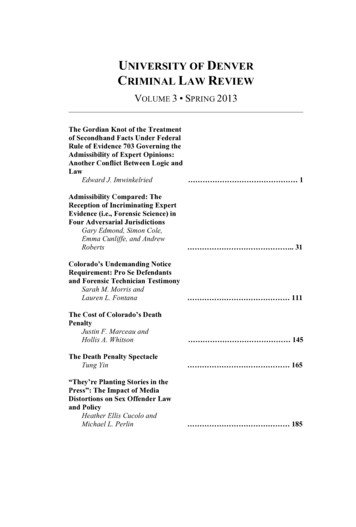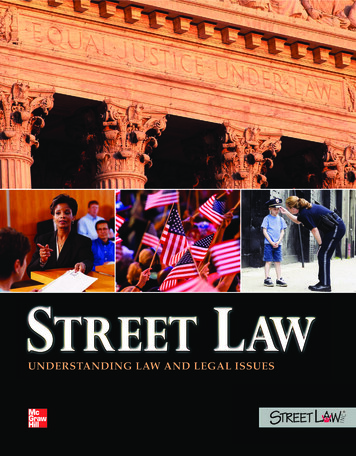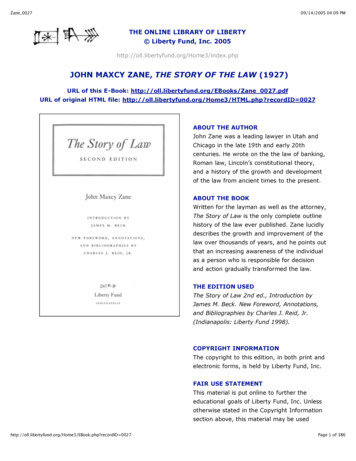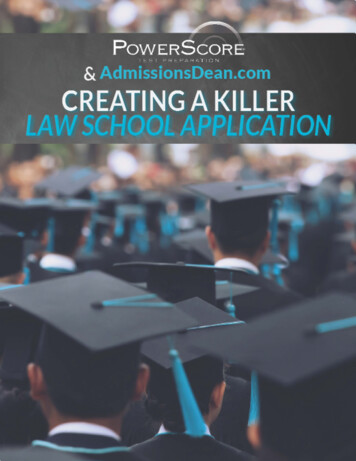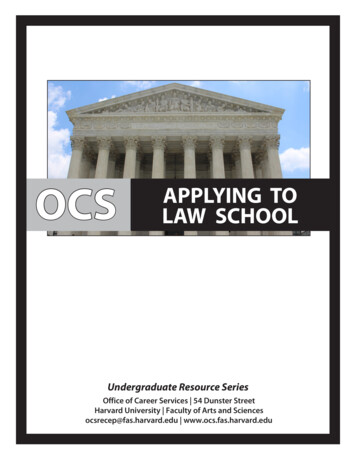
Transcription
OCSAPPLYING TOLAW SCHOOLUndergraduate Resource SeriesOffice of Career Services 54 Dunster StreetHarvard University Faculty of Arts and Sciencesocsrecep@fas.harvard.edu www.ocs.fas.harvard.edu
2021 President and Fellows of Harvard CollegeAll rights reserved.No part of this publication may be reproduced in any way without the express writtenpermission of the Harvard University Faculty of Arts & Sciences Office of Career Services.7/21Office of Career ServicesHarvard University Facultyof Arts & SciencesCambridge, MA du
INTRODUCTIONAcareer in the field of law can encompass many aspects of society such as business, government,human and civil rights, international relations, medicine, law enforcement, politics,entertainment, sports, and the arts, as well as jurisprudence and academia. If you have a passion forlegal thought, strong oral and written communication skills, and a propensity for drawingthoughtful conclusions by analyzing fine details and complex information, then a law career may befor you. When contemplating a law degree, ask yourself: Why do you want to become a lawyer?How will earning a J.D. satisfy your career interests? How would membership in the legalprofession serve your long-term goals? Plan to do some research in terms of what you canreasonably expect to get out of a law degree both academically and professionally.Ways to learn more about applying to law school andexploring a career in lawExploration: Reach out to your House Pre-Law Tutor(s) to speak about the profession.Select “law” as one of your OCS Class Year listserv preferences to receiveemails about law-related programs and opportunities.Attend workshops about the legal profession.Become involved with one of the Harvard Pre-Law student organizations (suchas the Harvard College Law Society, Harvard Black Pre-Law Association,Harvard College Women in Law Association, Harvard University LegalCommittee, or the Small Claims Advisory Service).Conduct research on legal careers using the online resources available throughOCS.Consider an internship with an organization where you can learn more aboutlegal issues.Talk to lawyers to learn more about the legal profession. Contact people youknow or search the Harvard alumni database, accessible through the OCSwebsite. Or, connect with alumni and other professionals via LinkedIn.Applying: Set up a time to connect with your House Pre-Law Tutor(s) to discuss yourapplication plans.Attend an OCS “Applying to Law School 101” session.Attend Law School Night in the fall to learn more about, and connect with, toplaw schools from across the country.Set up an account with the Law School Admission Council – www.lsac.orgSit in on a class and meet current students at Harvard Law School or otherschools you are interested in attending. (Talk to your Pre-Law tutor(s) and/orcontact the professor first.)
Questions to ask What do lawyers do on a daily basis? What is a typical work day like?What personal attributes are needed to be successful in a legal career?What is satisfying and dissatisfying about the field of law?What is the work/life balance like?What are typical practice areas and the range of jobs you can consider with a law degree?Why did you decide to go to law school? Has your career developed as expected?EMPLOYMENTSalaries and work hours vary widely across the profession. The median starting salary for an entrylevel Associate at a private firm is 125,000[1]. While a first-year corporate lawyer at a top law firmmay currently earn between 155,000- 190,000[2] in the first year out of law school, he/she mayalso have to work twelve hours a day, six or seven days a week. Government lawyers and those whowork in-house for a company or organization usually have more reasonable and predictable workschedules but earn a lower starting salary. Most of those interested in public interest law can expecta median starting salary of 54,325[1]. Lawyers entering a solo practice earn varying amountsdepending on their legal expertise and the region where they practice. In addition, many peopletrained as lawyers work in jobs where their legal training is of value but they are not actuallypracticing law.Realities of a Legal CareerAn important step in making your decision is to learn about the market for new lawyers. Make it apriority to explore the various career options for using your legal training. Think about broadcategories such as law, government, education, health care, and technology, and consider how theskills that you will receive from a legal education—such as research and writing, analysis andlogical reasoning, knowledge of substantive law and legal procedures, and time management—willbe utilized. Be sure to meet with your House Pre-Law Tutor(s) to consider non-legal careers forlawyers.PREPARING FOR LAW SCHOOLAdmissions committees consider a number of factors when evaluating candidates for law school.Among the most important are the strength of an applicant’s academic record and the applicant’sscore on the Law School Admission Test (LSAT) or the Graduate Record Examination (GRE). 1 Theseindicators, with letters of recommendation, a personal statement, and a resume typically constitutewhat is required for a completed application. Law schools also weigh the work experience ofapplicants and welcome applications from students who have taken time off betweenundergraduate study and law school. The majority of applicants will have taken time off betweentheir undergraduate and legal studies. Applicants are expected to have a solid understanding of lawschool and why they want to practice law.[1] NALP (2019) – Employment for the Class of 2019—Selected Findings. Retrieved from www.nalp.org[2] NALP (2019) – Findings on First-Year Salaries from the 2021 Associate Salary Survey. Retrieved from nalp.org1For a full list of law schools that accept the GRE, visit https://ets.org/gre/revised general/about/law
Law School Deferral ProgramsThere are currently two law school deferral programs to which students can apply: the JuniorDeferral Program (JDP) through Harvard Law School and the Leadership Experience AdmissionDeferral (LEAD) Program through Columbia Law School.Harvard Law School Junior Deferral Program (JDP)The Junior Deferral Program (JDP) allows students to apply to Harvard Law School as collegejuniors. If admitted, students will defer their admission for at least two years after graduationbefore matriculating to Harvard Law School. Application requirements for JDP applicants are thesame as for regular JD applicants. However, the JDP application opens in the spring and does nothave rolling admissions; instead, admission decisions are released during the summer, afterstudents’ spring grades become available. For more information about the JDP application anddeadline, please visit the JDP page on the Harvard Law School J.D. admissions website.Columbia Law School Leadership Experience Admission Deferral (LEAD)Fellowship ProgramThe Leadership Experience Admission Deferral (LEAD) Fellowship Program allows students toapply to Columbia Law School as college juniors or seniors. If admitted, students will defer theiradmission for two years after graduation before matriculating to the Law School. If students wish topursue an entrepreneurial venture during their deferral period, they can apply for a LEAD fundinggrant to support them. If admitted, LEAD Fellows are assigned a mentor, and are given priorityaccess to the Law School’s leadership and lecture series.The application components of the LEAD Fellowship program are similar to the JD application withthe exception of the personal statement. LEAD applicants will need to answer three required essayquestions in lieu of a personal statement. Additionally, the LEAD application opens in the spring,and does not have rolling admissions; instead, admissions decisions are released in early summer,after students’ spring grades become available. For more information about the LEAD applicationand deadline, please refer to the LEAD Fellowship section of the Columbia Law School J.D.admissions website: hoosing a ConcentrationThere is no “right concentration" that is recommended for preparing for law school. Law schoolsare looking for a diverse group of students from a variety of backgrounds. They are interested instudents who have selected courses that are academically challenging and that have cultivated anddeveloped the student’s ability to make inferences, reason logically, and analyze and presentcomplex information in a condensed and clear manner. The courses you take should also allow youto write extensively and practice research skills. For example, if you are interested in a law careerthat involves public policy or politics, you may want to consider a concentration in government orsocial studies or, if you are interested in working on issues related to the environment and workingfor the Environmental Protection Agency, then a concentration in one of the sciences may be thebest preparation.Your Academic RecordIn the admissions process, your academic record is a very important element. Therefore, be sure toconcentrate in a subject area that you enjoy and do well in. Admissions officers know fromexperience which departments have strong academic reputations and which courses have high andlow curves. According to the Harvard Law School Admissions Office, academic success is important
but other qualities that promote vitality, diversity, and excellence in the student body are alsovalued. As stated on its website, ".we have no computational methods for making admissiondecisions, no mechanical shortcuts, and no substitutes for careful assessment and good judgmentapplied to individual cases. We try to assess intangible qualities—concern for the welfare of others,energy, ambition, sound judgment, and high ideals. We have also found merit in allowing severalstrong factors to offset another factor on which an applicant may perform only modestly incomparison with other applicants. As a result, we emphasize that there are no ‘cut-off’ GPAs orstandardized test scores below which an application will not be considered in its entirety."Extra-curricular ActivitiesAdmissions committees do consider extracurricular activities when reviewing a candidate’sapplication. This is generally a means of looking at the candidate as a whole and obtaining acomplete and well-rounded picture of who they are reviewing. What law schools look for areleadership experience, work experience, research experience, community activities and publicservice. Be sure to pick activities that interest you and could provide the committee with a glimpseof what law you might be interested in practicing. However, do not sacrifice grades forextracurricular activities.SELECTING A LAW SCHOOLWhen applying to law schools, consider issues such as the faculty, national or regional reputation,placement of graduates, facilities, resources available at the institution, cost of attending, andlocation.FacultyWhen reviewing law schools, the strength, accessibility, and reputation of the faculty are keyfactors. Be sure to consider the academic and experiential backgrounds of faculty members, thestudent/faculty ratio, the number of full-time vs. adjunct faculty, and the number of female facultyand faculty of color at the institution.National or Regional SchoolsLaw schools are generally divided into three categories: National, Regional and Local. Schools witha National reputation tend to appear in various "top ten" lists. They draw students from across thenation and around the world and offer geographic mobility to students. Schools with a Regionalreputation are attended primarily by students from that region who may want to remain in thatarea after graduation, but who may also seek positions throughout the country.Placement of GraduatesBe sure to look at the data regarding placement of law school graduates and the percentage ofgraduates who succeed in passing the bar exam. The websites of the respective law schools shouldhave this information or you can connect with the admissions office of the schools you areinterested in to get an idea of where students tend to work upon graduation.Facilities and Resources at the InstitutionIt is worthwhile to connect with the schools you are interested in and inquire about the facilities,resources, and affiliations of the law school.
Cost of attending law schoolAttending law school is very expensive. In 2020 the average student debt upon completion wasapproximately 133,480 for graduates of private law schools and 93,131 for graduates of publiclaw schools.* Some law schools are more expensive than others and they have varying financial aidincentives. Although some law schools provide grants and scholarships, loans still constitute thebulk of how students finance their legal education. Most students do take loans to pay for their laweducation and consider this, amortized over time, a good investment in their future earningpotential.LocationIs the school in an urban area or a suburban/rural setting? Is it part of a university or independent?If you are interested in a dual-degree program, are there other graduate schools nearby? Is theschool in a place you could see yourself living for three years and where you might be interested inworking following graduation? These are important questions to consider because where youattend law school often influences where you practice afterwards.* Law School Transparency (2021)- Law School Costs. Retrieved from Law School Transparency Data Dashboard. data.lawschooltransparency.comAPPLYING TO LAW SCHOOLMeet with your House Pre-Law TutorAt Harvard there are many resources. All of the Houses have a Pre-Law tutor or tutors—currentlaw students or recent graduates—who assist students interested in applying to law school. Thefirst step in your exploration of a possible career in law is to speak with your Pre-Law tutor(s) whocan help you create a strategy for maximizing your chances for success. Later when you areapplying to graduate programs, Pre-Law tutors and writing tutors are great resources for studentswho are working on applications and personal statements.Attend an OCS Applying to Law School 101 SessionThese overview sessions are offered during the fall semester and are geared toward juniors andseniors who are currently in the process of applying to law school. These sessions help introducestudents to the application process and to helpful resources.Take the Law School Admission Test (LSAT) or the Graduate RecordExamination (GRE)The Law School Admission Test (LSAT) or the Graduate Record Examination (GRE) is required foradmission to all American Bar Association (ABA)-approved law schools. The LSAT is accepted by allABA-approved law schools, while the GRE is only accepted by a select number of law schools. TheLSAT is administered by the Law School Admission Council (LSAC). At the time of publication, theLSAT is being offering as a remotely-proctored version of the exam. There are eight testadministrations scheduled from August 2021-June 2022. More detailed LSAT information—dates,fees, and deadlines—and registration information is available online at https://lsac.org.Note that LSAT test dates fill quickly; therefore, it is advisable to register several months in advanceof a test date. The optimal time to take the exam is in the summer before the fall in which you apply.However, taking a fall test administration will still allow you enough time to submit your score withyour fall applications. If you decide to take the test and apply in a future cycle, your score will be
valid for five years.The LSAT provides law school admissions committees with a common measure of applicants'aptitude for legal study. The test consists of four multiple-choice sections and one writing section,each 35 minutes in length:1) one reading comprehension section2) one analytical reasoning section3) one logical reasoning section4) one experimental test question section (not scored)5) a 35-minute writing section (administered separately; not scoredYour score is computed on a scale of 120 to 180, based on the number of questions you answercorrectly; there is no deduction or penalty for incorrect answers, so it is advantageous to guess ifyou do not have time to answer a question.Graduate Record Examination (GRE)The GRE is administered by the Educational Testing Service (ETS). The exam is computer-based,and is offered multiple times throughout the year. At the time of publication, ETS is offering an inperson and an at-home option for the GRE General Test. The duration of the exam isapproximately 3 hours and 45 minutes, and consists of six sections:1)2)3)4)One Analytical Writing section (two separately-timed tasks; 30 minutes each)Two Verbal Reasoning sections (30 minutes each)Two Quantitative Reasoning sections (35 minutes each)Unscored/unidentified section or research section (varies)The GRE score scale is 130–170 (in one-point increments) for the Verbal Reasoning sections and forthe Quantitative Reasoning sections and the score scale for the Analytical Writing section is 0–6 (inhalf-point increments). Detailed GRE test information–dates, fees, and deadlines–and registrationinformation is available online at www.ets.org.Not all law schools accept GRE scores. 2 Therefore, if you are thinking of applying to multiple lawschools or if you are considering other graduate programs, you will want to think about which examwould be the best option for you. For help thinking through your decision, please consult with yourHouse Pre-Law Tutor(s).The Credential Assembly Service (CAS)To centralize and standardize objective application information – GPAs and LSAT scores – ABAapproved law schools require applicants to subscribe to the Credential Assembly Service (CAS).Applicants with a GRE score(s) will still need to subscribe to the CAS as well. The service organizesand analyzes applicant information in a way that allows law schools to compare academic recordsfrom undergraduate schools that use different grading systems. Register for the CAS, and then haveyour transcript from each college or university from which you have earned academic credit sentdirectly to LSAC.If you were enrolled in a study abroad program sponsored by another U.S. college or university, inaddition to your Harvard transcript, you must have the college or university that sponsored the2For a full list of law schools that accept the GRE, visit https://www.ets.org/gre/revised general/about/law
study abroad program send a transcript directly to the CAS. List the institution when you registerfor the Credential Assembly Services under “other Institution.”The ApplicationYou can apply to any ABA-approved law school through the CAS electronic application, whichstreamlines the process by allowing you to enter common information only once; you thencomplete each school’s individual application and submit your applications electronically.Personal StatementPersonal statements are requested by most law schools and provide the opportunity to go beyondthe objective aspects of the application to discuss who you are and what is important to you. Thispersonal statement is an invitation to write a limited-length essay about yourself. It is notnecessarily asking that you explain your motivation for law school; rather it is providing you anopportunity to explain to the school what distinctive experiences, personality traits, values,academic skills and passions, etc. you would bring to a class. It can be viewed, in essence, as theinterview that very few law schools grant. This personal statement should be more mature than thetype of essay you may have written for undergraduate admissions. You should begin to compose apersonal statement in the early fall, which you can assume will be suitable for all applicationsUNLESS any of your schools requests a specific topic or style.Personal statements are typically two double-spaced pages, though you may find that some schoolswill give more latitude. If schools don’t provide guidelines on length, it’s advisable to submit astatement that is approximately two pages in length. A few schools will limit the number of wordspermitted and you should abide by their guidelines. House Pre-Law tutors and writing tutors can bea great resource for students who are preparing their statements.Letters of RecommendationMost law schools request that one or two letters of recommendation be submitted on behalf ofapplicants. Admission committees will be seeking information not provided elsewhere in theapplications. Recommendation letters should include concrete examples of intellectual strength,judgment, motivation, and leadership, along with an appraisal of communication skills and acomparison to peers.In early fall, you should plan your recommendation-gathering strategy, or see whatrecommendations are already in your House file. If you have not made yourself and your law schoolapplication plans known to your House Pre-Law Tutor, you should do so.Two academic letters of recommendation are the usual request in law school applications, but youshould be sure to check each application for possible variations. Such letters should be requestedearly enough so that the writer is not rushed, and can comfortably complete the task in time.Letters can also be requested (and kept in your House file) if you think you will apply in the futurebut are not doing so immediately. You should also plan to keep in touch with potentialrecommenders.When you reach out to potential recommenders for a letter, it is best not to do so on the fly. Afterascertaining that they can write a favorable letter on your behalf, you might make an appointmentto discuss the ways in which they know you, perhaps bringing a paper (with comments) written intheir class, or a set of class discussion topics in which you participated. They may ask for a resumeand your personal statement, and even a transcript. Such documents could help provide writers
with a more well-rounded view of you, but, in fact, it is an analysis of your performance in theirfield of expertise that schools specifically seek.We strongly suggest that all Harvard candidates use the LOR (Letter of Recommendation Service), arecommendation-collecting and distributing service which is part of CAS.ResumeLaw schools typically require a resume as part of the application. OCS has a resume guide andtemplates which can be downloaded from the OCS website at rs. Have a copy of your resume reviewed by an OCS adviser before you submit yourapplication.Dean’s CertificationsA dean’s certification (or letter/clearance) is required by some law schools to confirm thatapplicants have not been involved in academic or disciplinary transgressions. Please contact yourResident Dean if a school you are applying to requires a letter.Financial Aid ResourcesFree Application for Financial Aid (FAFSA): l Student Aid: https://studentaid.gov/LSAC “paying for law school” section: wschoolAccessLex Institute : www.accesslex.org (information about financing a legal education)Public Interest Law Resources: https://www.equaljusticeworks.org/ (information about loanrepayment programs and public interest law)PUBLICATIONS AND ONLINE RESOURCESThere are many resources available to help you evaluate and research law schools. In addition tothe online resources listed below, there are also print resources available at OCS.The Official Guide to ABA-Approved Law Schools. This guide provides comprehensiveinformation on the 200 American Bar Association-approved law schools, including faculty, libraryresources, enrollment, bar passage, placement, and GPAs. The guide is accessible free of chargethrough the LSAC website at https://officialguide.lsac.org/Harvard Law School Legal Careers Self-AssessmentHelps potential students assess their interest in public interest law, and to consider a wide varietyof career and life planning issues when weighing their desire to uestionsThe National Association for Law Placement (NALP)An online directory of law schools which is straightforward and easy to use.https://www.nalplawschools.org/
TrialsA residential summer scholarship program for students of racial, ethnic, and socioeconomicbackgrounds that are currently underrepresented at the nation’s leading law schools. Partnershipbetween Harvard Law School, NYU School of Law, and the Advantage Testing Foundation.https://trials.atfoundation.orgKhan Academy Official LSAT PrepFree online LSAT prep resources are offered through Khan Academy in partnership with the LawSchool Admission Council (LSAC).https://www.khanacademy.org/prep/lsat
Attend an OCS “Applying to Law School 101” session. Attend Law School Night in the fall to learn more about, and connect with, top law schools from across the country . Set up an account with the Law School Admission Council – www.lsac.org Sit in on a class and meet current




